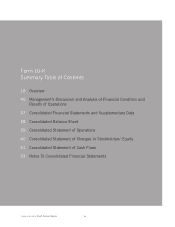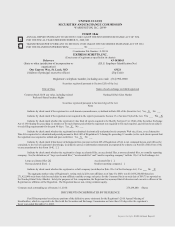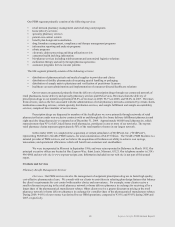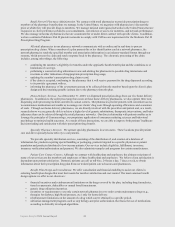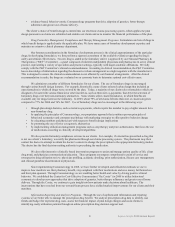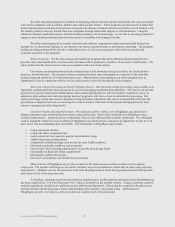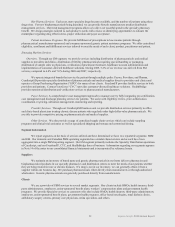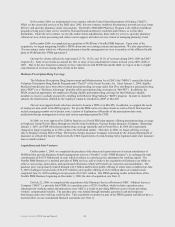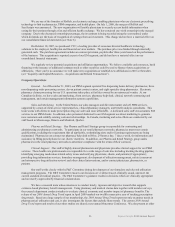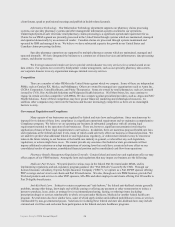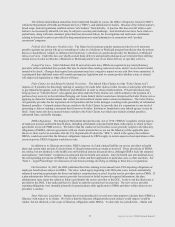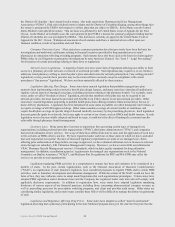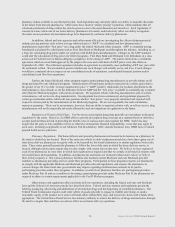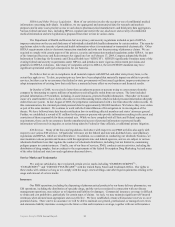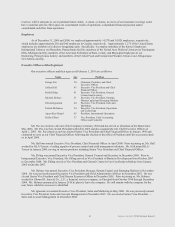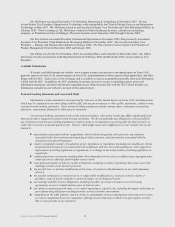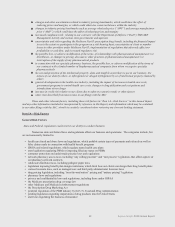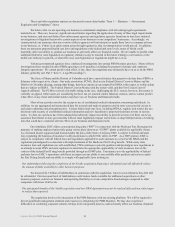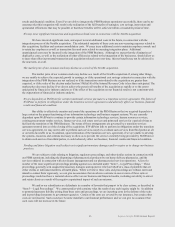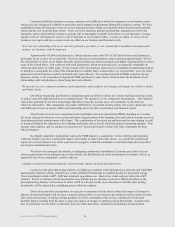Express Scripts 2009 Annual Report Download - page 28
Download and view the complete annual report
Please find page 28 of the 2009 Express Scripts annual report below. You can navigate through the pages in the report by either clicking on the pages listed below, or by using the keyword search tool below to find specific information within the annual report.
Express Scripts 2009 Annual Report 26
client forums, speak at professional meetings and publish in health-related journals.
Information Technology. Our Information Technology department supports our pharmacy claims processing
systems, our specialty pharmacy systems and other management information systems essential to our operations.
Uninterrupted point-of-sale electronic retail pharmacy claims processing is a significant operational requirement for us.
Claims for our PBM segment are presently processed in the United States through systems which are maintained, managed
and operated domestically by an outsourced vendor. Canadian claims are processed through systems maintained and
operated by IBM and managed by us. We believe we have substantial capacity for growth in our United States and
Canadian claims processing facilities.
Specialty pharmacy operations are supported by multiple pharmacy systems which are maintained, managed and
operated internally. We have integrated the business to a common set of shared services and infrastructure, data processing
centers, and disaster recovery.
We leverage outsourced vendor services to provide certain disaster recovery services for systems located at our
data centers. For systems not covered by third partner vendor arrangement, such as our specialty pharmacy data centers,
our corporate disaster recovery organization manages internal recovery services.
Competition
There are a number of other PBMs in the United States against which we compete. Some of these are independent
PBMs, such as Catalyst RX, Medco, and MedImpact. Others are owned by managed care organizations such as Aetna Inc.,
CIGNA Corporation, UnitedHealthcare, and Prime Therapeutics. Some are owned by retail pharmacies, such as Caremark
(owned by CVS), Rite Aid Health Solutions and Walgreens Health Initiatives. Wal-Mart Stores, Inc. may continue to
engage in certain activities competitive with PBMs. We also compete against specialized providers, such as Argus and SXC
Health Solutions. Some of these competitors may have greater financial, marketing and technological resources. In
addition, other companies may enter into the business and become increasingly competitive as there are no meaningful
barriers to entry.
Government Regulation and Compliance
Many aspects of our businesses are regulated by federal and state laws and regulations. Since sanctions may be
imposed for violations of these laws, compliance is a significant operational requirement and we maintain a comprehensive
Compliance program. We believe we are operating our business in substantial compliance with all existing legal
requirements material to the operation of our businesses. There are, however, significant uncertainties involving the
application of many of these legal requirements to our business. In addition, there are numerous proposed health care laws
and regulations at the federal and state levels, many of which could adversely affect our business or financial position. We
are unable to predict what additional federal or state legislation, regulatory, or enforcement initiatives may be enacted or
taken in the future relating to our business or the health care industry in general, or what effect any such legislation,
regulations, or actions might have on us. We cannot provide any assurance that federal or state governments will not
impose additional restrictions or adopt interpretations of existing laws that could have a material adverse effect on our
consolidated results of operations, consolidated financial position and/or consolidated cash flow from operations.
Pharmacy Benefit Management Regulation Generally. Certain federal and state laws and regulations affect or may
affect aspects of our PBM business. Among the laws and regulations that may impact our business are the following:
Medicare Part D Laws. We participate in various ways in the federal Part D created under MMA, and its
implementing regulations and sub-regulatory program guidance (the “Part D Rules”) issued by the CMS. Through our
licensed insurance subsidiary, Express Scripts Insurance Company (“ESIC”), we operate as a Part D PDP sponsor offering
PDP coverage and services to our clients and Part D beneficiaries. We also, through our core PBM business, provide Part
D related products and services to other PDP sponsors, MA-PDs and other employers and clients offering Part D benefits to
Part D eligible beneficiaries.
Anti-Kickback Laws. Subject to certain exceptions and “safe harbors,” the federal anti-kickback statute generally
prohibits, among other things, knowingly and willfully paying or offering any payment or other remuneration to induce a
person to purchase, lease, order, or arrange for (or recommend purchasing, leasing, or ordering) items (including
prescription drugs) or services reimbursable in whole or in part under Medicare, Medicaid or another federal health care
program. Several states also have similar laws, some of which apply similar anti-kickback prohibitions to items or services
reimbursable by non-governmental payors. Sanctions for violating these federal and state anti-kickback laws may include
criminal and civil fines and exclusion from participation in the federal and state healthcare programs.


